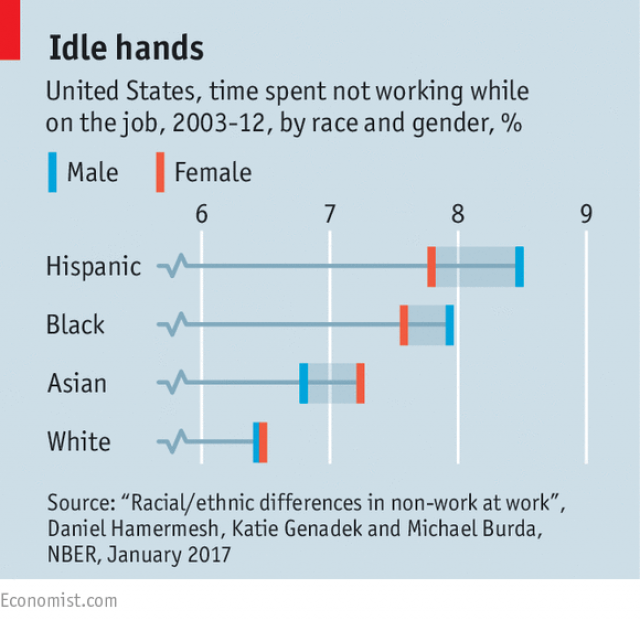Tentando explorar respostas (politicamente incorrectas) a estas perguntas (politicamente incorrectas), em particular porque são mais pobres as zonas com maiores representações de negros e hispânicos (sendo que a resposta mais óbvia, mas não necessariamente certa, é que são mais pobres porque têm mais negros e hispânicos) e, nesse caso, porque são mais pobres negros e hispânicos?
Tentando explorar respostas, cheguei ao paper «Racial/Ethnic Differences in Non-Work at Work» de Daniel Hamermesh, Katie Genadek e Michael Burda publicado no início deste ano que, repare-se no pormenor, apesar de um tema e de conclusões politicamente incorrectas, tem uma mulher, perdão um ser humano do género feminino, entre os autores.
Seguindo, uma vez mais, o conselho de Confúcio, aqui fica um diagrama da Economist, por via da qual lá cheguei.
Para que não haja dúvidas, cito também o abstract do paper que diz o essencial:
«Evidence from the American Time Use Survey 2003-12 suggests the existence of small but statistically significant racial/ethnic differences in time spent not working at the workplace. Minorities, especially men, spend a greater fraction of their workdays not working than do white non-Hispanics. These differences are robust to the inclusion of large numbers of demographic, industry, occupation, time and geographic controls. They do not vary by union status, public-private sector attachment, pay method or age; nor do they arise from the effects of equal-employment enforcement or geographic differences in racial/ethnic representation. The findings imply that measures of the adjusted wage disadvantages of minority employees are overstated by about 10 percent.»


Muito obrigado pela elucidação.
ResponderEliminarUm estudo que é para divulgar sobretudo porque, sem estudo algum, este facto é bem conhecido neste país.